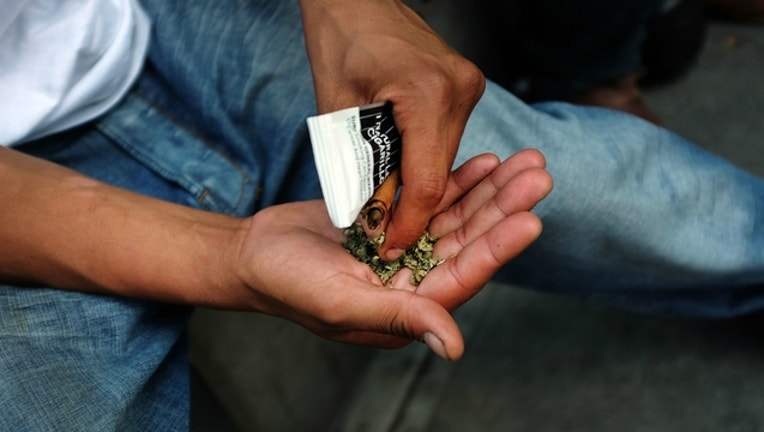New Illinois law bans all types of ‘fake weed'

A man prepares to smoke K2 or 'Spice', a synthetic marijuana drug, along a street in East Harlem on August 5, 2015 in New York City (Photo by Spencer Platt/Getty Images)
Sun Times Media Wire - Hundreds of new laws are set to go into effect at the stroke of midnight on New Year’s Day, including a pot-related measure that adds all synthetic cannabinoids to the Illinois Controlled Substances Act.
Senate Bill 2341 classifies synthetic substances as dangerous Schedule I drugs if they haven’t been approved by the U.S. Food and Drug Administration or aren’t being dispensed or possessed in accordance with state or federal law. Piperazines, which mimic the effects of ecstasy, and synthetic cannabinoids were both targeted in the legislation.
Synthetic pot, often marketed as “K2” or “spice,” is made by spraying chemicals on dried plant material or sold as a liquid for use in vaporizers, according to the Illinois Department of Public Health. While many synthetic cannabinoids are already illegal in Illinois, the new measure closes a loophole that has allowed drug makers to skirt the law by making minor changes to an illegal drug’s chemical composition.
This Spring, the IDPH linked four deaths and over a hundred illnesses to the use of synthetic cannabinoids that were laced with rat poison. Symptoms included coughing up blood, bloody urine, a severe bloody nose, bleeding gums and internal bleeding, the agency said.
“Like so many other drugs, synthetic cannabinoids are addictive and people are not able to give them up,” IDPH Director Dr. Nirav D. Shah said earlier this year. “Alternatively, they think that it won’t happen to them because they know their dealer or trust wherever they purchased the drugs.”
Synthetic pot manufacturers and people caught with the drug will soon face Class 3 and Class 4 felonies, respectively.
Some of the most crucial elements of Senate Bill 336, or the Alternatives to Opioids Act, are also expected to take effect at the end of January. The measure, signed into law in August by Gov. Bruce Rauner, gives patients diagnosed with a condition requiring an opioid prescription the option to obtain a temporary medical cannabis card.
Starting Jan. 31, qualifying patients will need to obtain a doctor’s note verifying their condition before they can apply for a 90-day medical card through the Opioid Alternative Pilot Program, an offshoot of the state’s medical pot program. After 90 days, a doctor can then renew a patient’s card.
“[Opioid patients] will be registered, either online by establishing an account, or at a dispensary, and have immediate access to medical cannabis,” said Melaney Arnold, spokeswoman for the IDPH.
Starting that same day, the bill will also allow other medical cannabis applicants to qualify for provisional access to the program. The move aims to address a backlog of applications that has left some prospective patients waiting months for a medical pot card.
After receiving a provisional registration letter confirming their application and fees are being processed, new or renewing applicants will be able to purchase medical marijuana products for 90 days. After that, applicants will be able to renew their provisional registration for another 90 days if they haven’t received their permanent medical card within that window.

